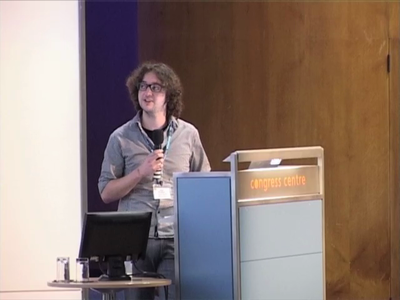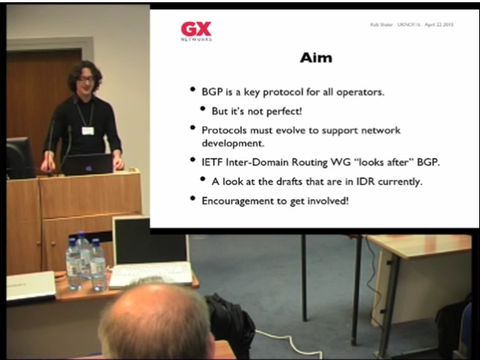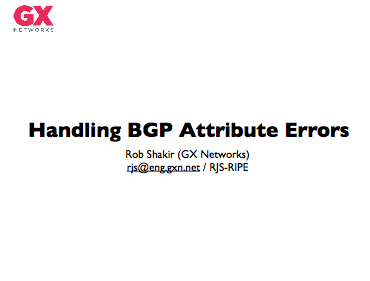OpenConfig Interfaces - Some Examples
imported Code · Tech · Work · ISP · IETF · python · OpenConfig · YANGI’ve talked a little on this site before about what we’re trying to achieve with OpenConfig. However, one of the observations that it’s easy to make is that YANG models alone don’t really achieve anything in terms of making the network more programmable. To make the network more programmable, we need to have tooling that helps us create instances of those modules, manipulate them, and then serialise the into a format that can be used to transmit data that conforms to the model to a device.
Reinforcing the Kitchen Sink - Another BGP Presentation
imported Work · ISP · BGP · IETF · Presentations · netnodOn Friday, I presented at the Netnod meeting in Stockholm, Sweden - again about BGP error handling - this time presenting a bit of an update as to why this continues to be a problem for the Internet (and private BGP deployments) - and why this work is still really relevant. In addition, I tried to give an overview of what the solution space looks like. I’m not sure whether there’s video, but as usual, the slides are linked below!
BGP Error Handling - Developing an Operator-Led Approach in the IETF
imported Tech · ISP · BGP · IETF · Presentations · UKNOFAs I presented at UKNOF 18, I have now written an Internet-Draft to address the requirements of Network Operators for how BGP should handle errors in UPDATE messages. The draft can be found on the IETF site, and I'm currently seeking opinions as to whether this reflects the an operational consensus! If you're an Operator (DFZ, MSE or otherwise), it would be great to hear from you!

I'll be presenting the draft at NANOG 51 in Miami on Tuesday - if you're there, feel free to ping me!
LINX71 - 100GE in the Lab
imported Tech · Work · ISP · PresentationsI spoke at LINX71 about the testing that we (C&W) have been doing in the lab with 100GigE - we got a pre-production card and hence had a look at the technology for real. Thanks to LINX, the presentation video can be seen by clicking on the image below.
Once again, however, whatever LINX use as a presentation laptop didn't render my slides properly - even though I'd submitted PDF too! Hence the slides can be found on this site.
UKNOF 16 - Enhancing BGP - Video
imported Work · London · ISP · BGP · IETF · UKNOF · PresentationsTom Bird of PortFast and Brandon Butterworth of Bogons do a great job of webcasting, and recording UKNOF video. Thanks to them, the video of the presentation I gave at UKNOF16 can be watched here. Or you can download it by clicking the image below!
As always, thoughts/comments/corrections most welcome!
This is also probably a good time to mention that my new work mail address is rob.shakir (at) cw.com
Leaving AS5413
imported Work · Me · ISPFor information, and because it means that I have revoked a bunch of UIDs from my GPG Key I am no longer working at AS5413 (Vialtus, Daisy, GX Networks etc.) as of June 18th, 2010. It's been a good two years, but the company direction no longer co-incides with the direction in which I would like to go. I've enjoyed the projects I've worked on, been in contact with a lot of great people, and learnt a lot!
Digital Economy Bill YouTube Questions
imported Tech · ISP · UKSo, if we take a moment to look at the following responses to questions that the leaders of the three parties involved in the “Digital Debate” on YouTube gave, concerning the Digital Economy Bill:
Looking simply at two issues:
- Fibre Taxation - in the UK, if a business is to light up a fibre pair, as well as any standard taxes (e.g. VAT) that must be paid, then an additional VoA Business Rate is due on these fibres. This can be up to �500/pair/year outside of London, and �600/pair/year in the London metro region [source: Valuation Office Agency].
Let's look at what this does for the telecommunications industry in the UK, especially for small players. Since such a company probably does not have a DWDM system, then the relatively cheap fibre runs are now taxed quite highly, should such a company then want to start increasing their capacity, then the additional costs are inflated due to taxation. Where larger players might be able to split these rates over a large number of DWDM channels (up to 32 or 64) a smaller provider might only have one channel - and hence the cost of infrastructure or customer links for smaller companies is inflated, due to the fact that they cannot justify the CapEx required for such multiplexing systems. Even for larger players, this isn't encouraging large scale fibre build out. If tax is paid per route-KM for every FTT{H,P,C} deployment, then this adds an additional overhead (in avoidable taxation!) to any such roll-out. Hardly an incentive for a commercial entity to begin such a deployment! Alongside the CapEx, OpEx, and business rates you are required to pay - the UK government will tax you just for lighting up the infrastructure they are encouraging you to build! This alone is not helping with any of the three party's plans for any kind of broadband roll-out, especially to rural areas where there is no profit for commercial entities to roll out such technologies. - Digital Economy Act - Andrew Cormack of JANET (UK) gave an excellent presentation at UKNOF relating to the DEA. There are two key points here:
- The government (and apparently the Tories) believe that this bill being pushed through in "wash-up" was the right thing to do. Contrast this with the fact that they also appear to be stating that the digital economy (and communications that such an economy provides) is key for Britain. I agree it's key, we're a services based economy, and if more services can be provided utilising the Internet, then one of two things will happen. Either the UK will not be equipped to deliver such services globally, and the "Digital Economy" will mean that these can then be out-sourced to other countries - or the UK will be in a position to grow the services that it can deliver, with the considerable skill of the UK workforce, into both global and European markets. Any bill therefore, that affects the manner in which this "Digital Economy" (by which I'm now referring to ISPs and telcos), should therefore, one would have thought, justify reasonable debate by the fully attended (?!) Commons!
- Westminster appears to have no idea as to who they are legislating for. I am not against ensuring that the creative industries are able to protect their rights - however, this needs to be done in a manner that can be policed without damaging another industry. As Andrew said in his presentation the Government is unsure of how many ISPs are in scope - stating it could be 5, 10, 20 or 450. How can the impact of legislation be considered, if the Government cannot identify the scope? In addition, whilst many rights holders, I would imagine, will say "well, there is very little that is being requested of the ISPs here!" - the technical challenges of implementing mechanisms whereby specific IP addresses, and users can be located, within the timeframes that such complaints appear to take to be progressed, should be costed. I believe that most people within the xSP industry are not going to say "We don't care about your rights as a content producer", however, how can the Government expect our industry to pay directly to police this? We don't care that customer X is pulling data A, B and C - really, once it comes down to working in a larger ISP, we care about getting bit X to endpoint Z whilst ensuring any commercial guarantees that we have made for bit X.
Juniper PSN-2010-01-626 (AS4 Again!)
imported Tech · ISP · Cisco · JunOSe · BGP · IOS · JunOSI’ve had a couple of mails relating to this PSN, which again references the research that Andy Davidson, Jonathan Oddy and I did last year. It seems that some of the sources of the initial mailing list posts we made are gone (particularly the merit.edu one that is referenced from both Juniper’s site and most other places). For that reason, I’ve included both the mails that we sent to NANOG/C-NSP/J-NSP last year here.
Network Updates and Opportunities
imported Tech · Work · ISPA quick personal post to break the silence here!
I’m currently very interested in hearing about any UK or EU-based network engineering or architecture opportunities that are out there, especially in SP networks that run MPLS with TE. If anyone has some such opportunity, or knows of something that they think might suit me – please drop me a mail to rjs@rob.sh for a copy of my CV.
An outline of my CV is available on LinkedIn.
I’m hoping to find some time to put some technical articles together that can be posted here in the near future.
LINX 65 Presentation
imported Tech · Work · ISP · LINX · Cisco · Code · BGP · IETF · PresentationsFurther to my previous post - I presented this issue at LINX65 - video and slides can be found below.
Video
Fixed Slides - LINX’s PowerPoint install seems to have corrupted my slides on the day.
Comments and feedback are most welcome.
Older » Post Index


